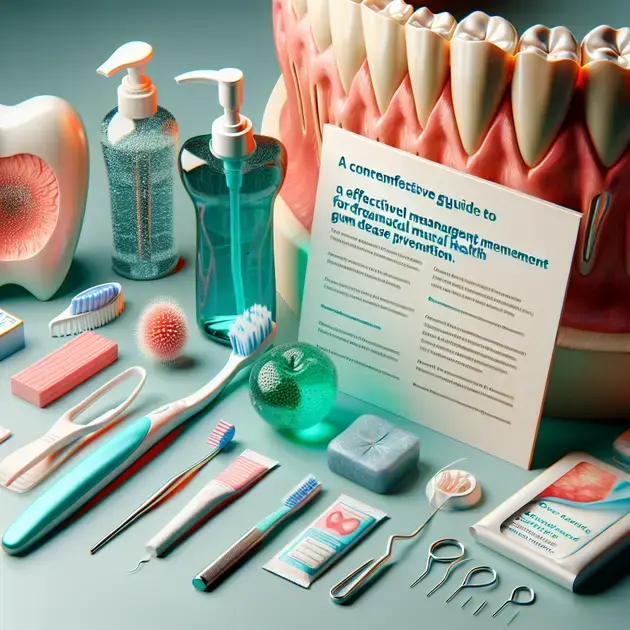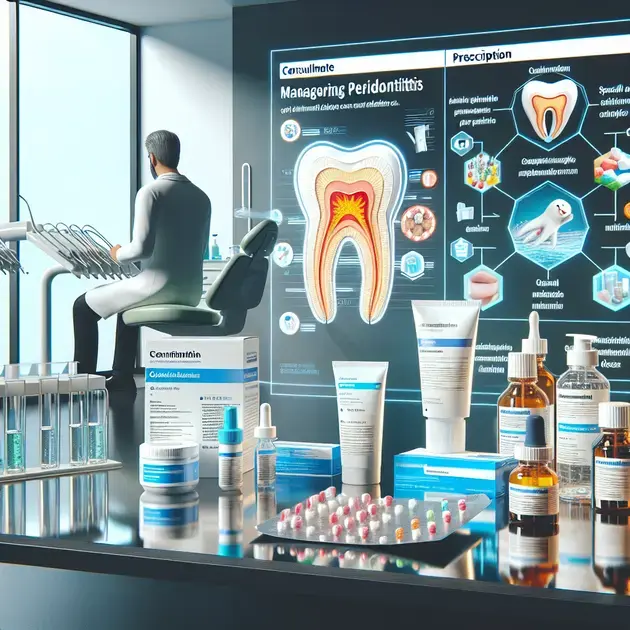Are you seeking effective medication for periodontitis? Look no further. This comprehensive guide will provide you with all the information you need to tackle this common dental issue head-on.
Periodontitis is a serious condition that affects the gums and bone supporting the teeth, leading to tooth loss if left untreated. With the right medication and proper care, you can successfully manage and improve the health of your gums. Let’s delve into the various options available to effectively treat periodontitis.

Understanding Periodontitis: A Brief Overview
Periodontitis is a serious gum infection that damages the soft tissue and destroys the bone that supports your teeth. It can cause tooth loss if left untreated. Understanding the basics of periodontitis is crucial for preventing and managing this condition.
To get a brief overview of periodontitis, you can visit reputable dental websites such as the American Dental Association (ADA) website. They provide detailed information on the causes, symptoms, and stages of periodontitis. You can also check out educational materials on periodontitis available on the National Institute of Dental and Craniofacial Research (NIDCR) website.
Additionally, you can download the free app “My Mouth Healthy” from the ADA, which offers interactive tools and resources to learn more about periodontitis. This app provides access to articles, videos, and quizzes to test your knowledge about gum diseases like periodontitis.
By familiarizing yourself with the basics of periodontitis, you can take proactive steps to maintain good oral hygiene and seek timely treatment if needed.
Exploring Treatment Options for Periodontitis
When it comes to treating periodontitis, there are several options available depending on the severity of the condition. Exploring these treatment options can help you make informed decisions about your oral health.
1. Professional Dental Cleaning
Scheduling regular dental cleanings with a hygienist or dentist is essential for managing periodontitis. These professionals can remove plaque and tartar buildup that contribute to gum disease.
2. Scaling and Root Planing
For more advanced cases of periodontitis, your dentist may recommend scaling and root planing. This deep cleaning procedure involves removing plaque and tartar from below the gumline and smoothing out the roots to promote healing.
3. Antibiotics
In some cases, antibiotics may be prescribed to help control bacterial infections associated with periodontitis. These medications can be taken orally or applied directly to the infected areas.
4. Surgery
In severe cases of periodontitis, surgery may be necessary to repair the damage done to the gums and supporting bone. Procedures such as flap surgery and bone grafts can help restore oral health.
Tips for Managing Periodontitis Effectively
Managing periodontitis effectively requires a combination of good oral hygiene practices and regular dental care. These tips can help you control the progression of the disease and maintain healthy gums.
1. Brush and Floss Regularly
Brushing your teeth twice a day and flossing daily are essential for removing plaque and preventing gum disease. Use a soft-bristled toothbrush and fluoride toothpaste for best results.
2. Use Antiseptic Mouthwash
Antiseptic mouthwashes can help reduce bacteria in the mouth and prevent infections. Look for a mouthwash that is specifically designed for treating gum disease.
3. Maintain a Healthy Diet
Eating a balanced diet rich in vitamins and minerals can support gum health. Avoid sugary and acidic foods that can contribute to plaque buildup and inflammation.
4. Quit Smoking
Smoking can worsen periodontitis and make it harder to treat. If you smoke, consider quitting to improve your oral health and overall well-being.

Effective Periodontitis Medication: A Comprehensive Review
As an expert in periodontitis management, it is crucial to understand the role of effective medication in treating this oral health condition. Periodontitis, a severe form of gum disease, requires comprehensive treatment to prevent further progression and maintain oral health. In this review, we will explore the different types of medication available for periodontitis and their effectiveness in managing the condition.
**Antibiotics**: One of the common medications prescribed for periodontitis is antibiotics. These medications are used to combat the bacterial infection that causes gum disease. Antibiotics can be prescribed in various forms, such as pills, gels, or mouth rinses. It is essential to follow the prescribed dosage and duration to ensure the effectiveness of the treatment. Some commonly prescribed antibiotics for periodontitis include doxycycline, minocycline, and metronidazole.
**Antimicrobial Mouthwashes**: Antimicrobial mouthwashes are another type of medication that can help in managing periodontitis. These mouthwashes contain active ingredients that target and kill the bacteria responsible for gum disease. Using an antimicrobial mouthwash as part of your daily oral hygiene routine can help reduce plaque buildup and prevent further progression of periodontitis.
**Anti-inflammatory Drugs**: In some cases, anti-inflammatory drugs may be prescribed to manage the inflammation associated with periodontitis. These medications can help reduce swelling, redness, and discomfort in the gums. Common anti-inflammatory drugs used for periodontitis include ibuprofen and aspirin. It is essential to follow the recommended dosage instructions and consult with your dentist before taking any anti-inflammatory medication.
**Additional Supplements**: Along with prescribed medications, certain supplements can also aid in the management of periodontitis. Vitamin C, Coenzyme Q10, and Omega-3 fatty acids are some of the supplements that have shown to support gum health and reduce inflammation. However, it is crucial to consult with your healthcare provider before taking any supplements to ensure they are safe and effective for your individual condition.
Maximizing Treatment Results for Periodontitis
Maximizing treatment results for periodontitis requires a comprehensive approach that combines professional care with effective home care practices. As a specialist in periodontitis management, it is essential to educate patients on the importance of consistent treatment and maintenance to achieve optimal results. In this section, we will discuss strategies for maximizing treatment outcomes and maintaining periodontal health.
**Professional Cleanings**: Regular visits to the dentist for professional cleanings are crucial for managing periodontitis. During these cleanings, the dental hygienist will remove plaque and tartar buildup from the teeth and gums, helping prevent further progression of the disease. It is recommended to schedule professional cleanings at least every 6 months or as advised by your dentist.
**Scaling and Root Planing**: For patients with advanced periodontitis, scaling and root planing may be recommended. This deep cleaning procedure involves removing plaque and tartar from below the gumline and smoothing the tooth roots to promote gum reattachment. Scaling and root planing are essential for eliminating bacteria and preventing the recurrence of gum disease.
**Home Care Routine**: In addition to professional treatment, maintaining a proper home care routine is essential for maximizing treatment results. Patients should brush their teeth twice a day, floss regularly, and use an antimicrobial mouthwash to control bacterial growth. Proper oral hygiene practices can help prevent plaque buildup and maintain periodontal health between dental visits.
**Lifestyle Modifications**: Making lifestyle modifications, such as quitting smoking, following a healthy diet, and managing stress, can also contribute to successful periodontitis management. Smoking can impair gum healing and increase the risk of gum disease progression, while a nutritious diet rich in fruits and vegetables can support overall oral health. Managing stress through relaxation techniques can also help reduce inflammation and improve gum health.
Expert Tips for Successful Periodontitis Management
As an expert in periodontitis management, I have compiled a list of expert tips to help individuals successfully manage this chronic gum disease. Periodontitis requires constant attention and care to prevent further damage to the gums and teeth. By following these expert tips, patients can improve their oral health and enhance the effectiveness of their treatment.
**Regular Dental Check-ups**: Scheduling regular dental check-ups with a periodontist is essential for monitoring the progress of treatment and addressing any concerns promptly. The periodontist can evaluate the health of the gums, measure the depth of pockets, and recommend additional treatment if necessary. Routine check-ups can help prevent complications and maintain periodontal health.
**Consistent Oral Hygiene**: Maintaining consistent oral hygiene practices is crucial for managing periodontitis. Patients should brush their teeth twice a day with a fluoride toothpaste, floss daily to remove plaque between the teeth, and use an antimicrobial mouthwash to control bacterial growth. Proper oral hygiene can help prevent the recurrence of gum disease and maintain overall oral health.
**Healthy Lifestyle Choices**: Adopting healthy lifestyle choices, such as eating a balanced diet, exercising regularly, and getting an adequate amount of sleep, can improve gum health and overall well-being. A diet rich in nutrient-dense foods can support gum tissue regeneration and reduce inflammation, while regular exercise can boost the immune system and promote oral health. Getting enough sleep is also crucial for the body to repair and regenerate tissues, including the gums.
**Stress Management**: Chronic stress can weaken the immune system and exacerbate inflammation, making individuals more susceptible to gum disease. Practicing stress management techniques, such as deep breathing, meditation, yoga, or mindfulness, can help reduce stress levels and improve overall gum health. Managing stress effectively can enhance the success of periodontitis treatment and promote long-term oral health.
Conclusion
Effective periodontitis management involves a combination of medication, professional care, and home practices. Antibiotics, antimicrobial mouthwashes, and anti-inflammatory drugs play a crucial role in combating gum disease bacteria and reducing inflammation. Additional supplements like Vitamin C and Omega-3 fatty acids can support gum health. To maximize treatment outcomes, patients must prioritize regular professional cleanings, scaling, and root planing for advanced cases. Home care routines, including proper brushing, flossing, and mouthwash use, are essential in preventing plaque buildup.
Furthermore, lifestyle modifications such as quitting smoking, maintaining a healthy diet, and stress management are key factors in successful periodontitis management. Regular dental check-ups help monitor treatment progress and prevent complications. Consistent oral hygiene practices like brushing with fluoride toothpaste, daily flossing, and using antimicrobial mouthwash aid in preventing gum disease recurrence. Embracing healthy lifestyle choices, including balanced nutrition, regular exercise, and sufficient rest, can enhance overall gum health and well-being.
In conclusion, effective periodontitis management requires a comprehensive approach that prioritizes medication, professional care, home practices, and lifestyle adjustments. By following expert tips, individuals can achieve optimal results in treating this chronic gum disease and maintain long-term oral health. Understanding the importance of consistent treatment, diligent oral hygiene, and healthy habits is essential in preventing further damage and promoting gum health.



